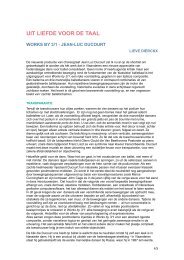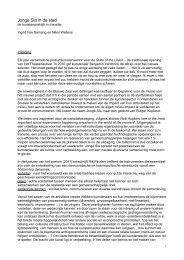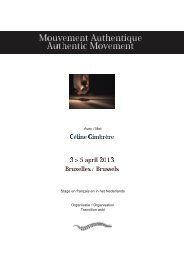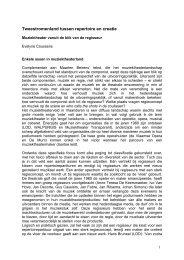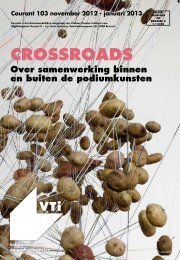music theatre in flanders - Muziekcentrum Vlaanderen
music theatre in flanders - Muziekcentrum Vlaanderen
music theatre in flanders - Muziekcentrum Vlaanderen
You also want an ePaper? Increase the reach of your titles
YUMPU automatically turns print PDFs into web optimized ePapers that Google loves.
scale productions often lack true <strong>in</strong>ternational ambition and content<br />
themselves with local acclaim. In Flanders, however, this<br />
<strong>in</strong>ternational dimension is present among both major and m<strong>in</strong>or<br />
organizations.<br />
At a recent Opera Europe Conference on <strong>music</strong> <strong>theatre</strong> and<br />
opera held <strong>in</strong> Oslo, the question was raised what our approach<br />
towards all these new operas could, or should, be. The Opera of<br />
Barcelona’s director expla<strong>in</strong>ed that he had proposed Covent Garden<br />
to take over the new opera creation he had commissioned from<br />
a Catalan composer. But there was no <strong>in</strong>terest, because Covent<br />
Garden already had a contemporary opera by a British composer,<br />
and because the production would be hard to sell to the London<br />
public. The Catalan composer’s lack of added value as well as the<br />
opera’s regional subject matter and composition aesthetics made<br />
the production unappeal<strong>in</strong>g for London audiences.<br />
In an attempt to bypass the differences <strong>in</strong> regional tastes,<br />
<strong>in</strong>terest<strong>in</strong>g but difficult forms of <strong>in</strong>ternational co-operation have<br />
been set up, br<strong>in</strong>g<strong>in</strong>g artists from different countries together. An<br />
artist’s participation <strong>in</strong> a production is beneficial to open a natural<br />
market <strong>in</strong> his country of orig<strong>in</strong>, but far too often, there is too much<br />
compromise. This k<strong>in</strong>d of co-operation can only prove successful<br />
if it is based on artistic necessity. If money is the only reason, the<br />
result is usually below standard.<br />
Some production houses or companies respond to the demands<br />
of the <strong>in</strong>ternational market by sett<strong>in</strong>g up artificial projects<br />
or by copy<strong>in</strong>g success formulas. Festivals play a major part as<br />
launch sites, but for production companies, it rema<strong>in</strong>s essential<br />
that the artist is <strong>in</strong> charge and that he is allowed to do his job<br />
without compromise.<br />
FOr FurTher COnSIderATIOn<br />
• In contemporary <strong>music</strong> <strong>theatre</strong>, the <strong>in</strong>ternational market is a<br />
necessity, either to get projects f<strong>in</strong>anced, or to <strong>in</strong>crease the<br />
number of venues. Certa<strong>in</strong> <strong>in</strong>ternational arts centres and<br />
festivals are becom<strong>in</strong>g <strong>in</strong>creas<strong>in</strong>gly <strong>in</strong>fluential <strong>in</strong> determ<strong>in</strong><strong>in</strong>g<br />
which names will make it, and which will not. For young<br />
makers, it has become extremely difficult to attract attention<br />
if they are not backed up by a strong producer or publish<strong>in</strong>g<br />
company, especially as the major festivals <strong>in</strong>creas<strong>in</strong>gly opt<br />
for well-established names to attract huge audiences. The<br />
question is what we can do about it. How can we prevent the<br />
lead<strong>in</strong>g festivals from merely exchang<strong>in</strong>g each other’s prestige<br />
projects? How can we safeguard the <strong>in</strong>flux of fresh blood?<br />
• That a lot of new operas and <strong>music</strong> <strong>theatre</strong> works are made is<br />
a good th<strong>in</strong>g, but among most producers and makers, there is<br />
a lack of quality awareness. International scope is to overrule<br />
regional concerns. A lot of works should, perhaps, never see<br />
the light of day or be elaborated. How can producers be made<br />
to adopt a more critical attitude towards their own artists and<br />
to work on an <strong>in</strong>ternational level?<br />
• A government can play a stimulat<strong>in</strong>g role to make the <strong>music</strong><br />
<strong>theatre</strong> landscape prosper. Certa<strong>in</strong> conditions for subsidiz<strong>in</strong>g<br />
can raise bottom-up potential and make it easier for smaller<br />
organizations to professionalize. Should the government,<br />
therefore, adopt an even more active policy, or should the talent<br />
that has been made to shoot up with the help of subsidies,<br />
now prove itself <strong>in</strong>stead?<br />
60 61<br />
table of contents









